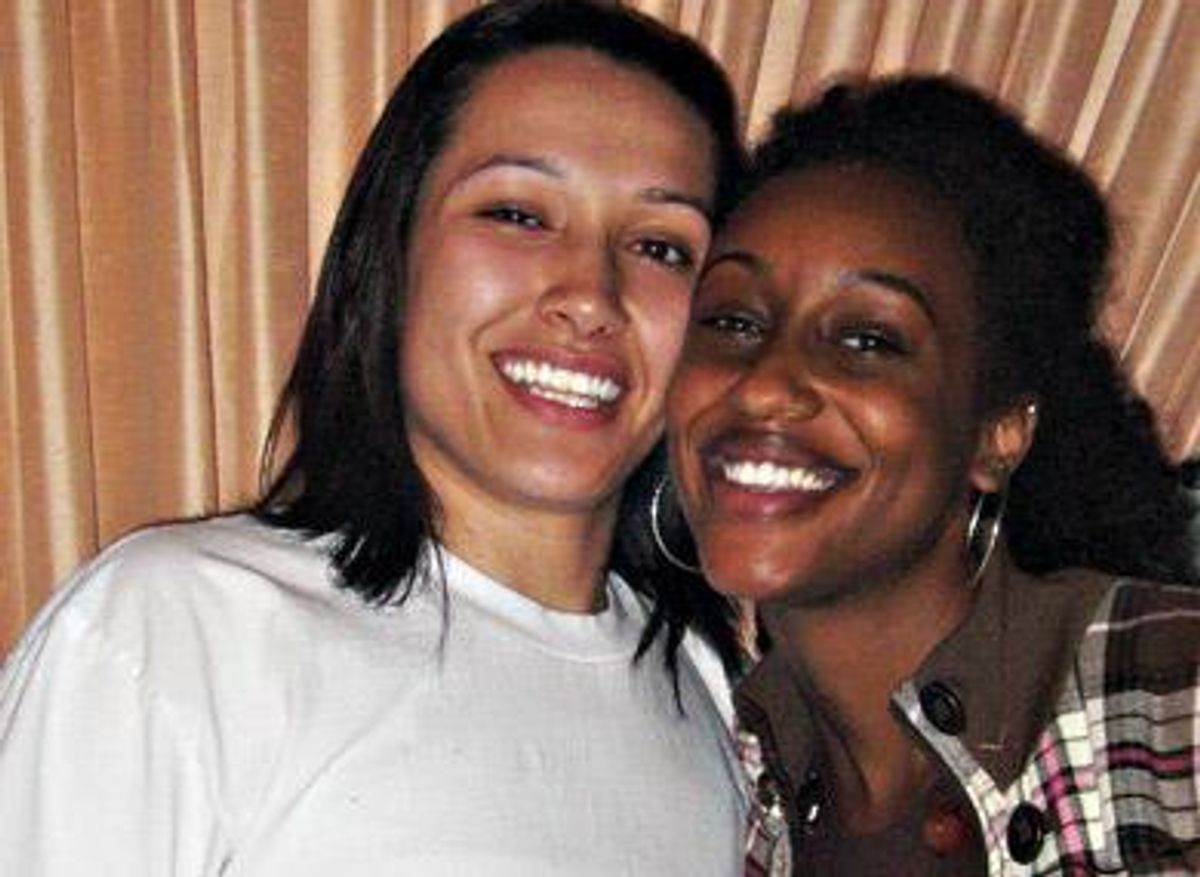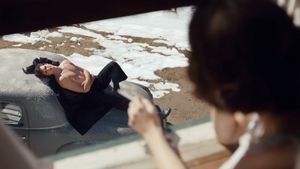Brilliant and beautiful, Mitrice Richardson found it easy to make people fall in love with her. The 24-year-old's charm was evident the evening of September 16 when she showed up at a glamorous Malibu, Calif., restaurant to eat dinner by herself. A group of young people soon asked her to join their table, and they enjoyed her company even though they found her banter increasingly odd.
Richardson told her dinner guests she was from Mars and reportedly began speaking in gibberish. This was not typical behavior for the former beauty pageant contestant, who graduated from Cal State Fullerton with a 4.0 grade point average, held down two jobs, volunteered for charity, and was in a committed relationship with another dynamic young woman.
Things went from weird to uncomfortable when Richardson couldn't pay her $89 tab for Kobe steak and an ocean breeze cocktail. After she unsuccessfully tried to have her grandmother pay the bill over the phone, the restaurant called Los Angeles County sheriff's officers. The cops found a small amount of marijuana in Richardson's 1990 Honda Civic. Richardson's car was impounded, and she was taken into custody at a Malibu sheriff's station on suspicion of defrauding an innkeeper and possession of marijuana.
Shortly after 1 a.m., Richardson -- who lived more than 30 miles away, in south Los Angeles -- was released on her own recognizance from the isolated station. An employee told Richardson she could spend the night at the station, but she declined the offer. She allegedly left without money or identification, which her family says remained in her impounded Civic. City buses had stopped running hours earlier.
Mitrice Richardson has been missing ever since.
This missing woman case didn't gain much traction in the media during the
first few weeks after her disappearance. She's young and pretty, but she's
also black, a lesbian, and works part-time as a dancer at a gay
nightclub. Nancy Grace et al typically glom onto kidnapping victims
of a certain demographic -- young, straight, privileged white women.
Flipping that script, Richardson's brilliant smile graced the cover of People on Thursday, along with five other young Americans who
disappeared without a trace (though the two-paragraph People piece had
no mention of Richardson being gay or dancing at a lesbian club).
Unlike
many missing people, Richardson did leave clues in her wake. She was
briefly spotted in the backyard of a Malibu home around 6:30 a.m. on
September 17. It's believed Richardson walked for hours after her
release from the Malibu station. The Los Angeles Police Department took
over the case from the Sheriff's Department, and days after Richardson was reported missing, they searched the
area's hills and canyons to no avail. But they admit there are now fresh
leads.
"Just this week -- it's a little bit out of the area but not
too far from Los Angeles -- there was a possible sighting in Thousand
Oaks," LAPD detective Chuck Knolls says. "There was someone who saw a
young black woman in a rural part of Thousand Oaks and called
it into the Ventura County sheriff. They responded with park rangers
and didn't find anybody."
The Thousand Oaks spotting gives
Knolls and Richardson's family hope the young woman vanished of her
own accord. But it's not clear why she'd want to abandon her family or
friends, and there's little evidence -- other than her strange behavior
in Malibu -- that she was struggling with a mental illness that may
have left her confused or irrational.
"She wasn't diagnosed with
any [mental illnesses]," says Tessa Moon, Richardson's girlfriend of two
years. "She wasn't getting any medication."
Moon moved to
the Bay Area for work six months after she met Richardson, and they've
been in a long-distance relationship ever since, seeing each other two
to three times a month. Moon was in Northern California the night
Richardson disappeared, and since September 17 she's shuttled between her home and Los Angeles to speak to the LAPD and anyone who might know
anything.
"There's only so much I can do [in the Bay Area]," Moon says. "I'm
constantly making trips back and forth, which I have no problem doing --
anything to find her -- but it's really getting frustrating and hectic."
Equally
weary are Richardson's parents. "Being skinned alive" is how Latice
Sutton, Richardson's mother, described the experience of Mitrice's
disappearance to People. Richardson's parents are divorced,
but both are a presence in their daughter's life. Michael Richardson,
an employee of the Saban Free Clinic in Los Angeles, has been outspoken
about the LAPD's handling of the case ("they're not doing anything")
and, up until the People cover, the paucity of media coverage. There's one group though, that he can't commend enough.
"I'm
highly grateful to the gay and lesbian community," Richardson says.
"They've been working with me, calling me, coming up with ideas. ... At the
beginning, I had a meditation over it, and said, 'Why aren't we
reaching out to her people?' I didn't want anyone to feel like we had
something to hide or we were embarrassed about her sexuality."
Both
Richardson and Moon call political consultant and blogger Jasmyne Cannick a
godsend -- Cannick is organizing community meetings and fund-raisers (a
recent event took place at the Los Angeles gay nightclub Jewel's Catch One)
and was instrumental in getting the word out to the local media in the early weeks of Richardson's disappearance.
"I thought the family had a big support team only to find out it's not as big as I thought it was," Cannick says. "It frustrated me. I wanted to figure out how we can use new technology and new media to help in a situation like this. And Facebook and Twitter are really good about spreading the word. If someone saw Mitrice in Las Vegas, they can Twitter that and let us know."
Not everyone has been so helpful. Michael Richardson says some people
refused help after finding out about Mitrice's sexuality and her
part-time job as a dancer at Club Ripples in Long Beach, Calif.
(Richardson works full-time as an executive assistant at a freight
company.)
"You have the old-school Christians, the hypocrites out
there, telling me, 'The Bible says [Mitrice] is going to hell for this;
this is God's way of showing her,'" Richardson says. "My daughter
taught me not to pass judgment. One of the quickest ways to lose
Mitrice [as a friend] is to act self-righteous."
Michael
Richardson takes particular umbrage at anyone suggesting his daughter
put herself in harm's way by dancing: "I hear, 'Oh, she was a dancer.
She was gay. First of all, she's a human
being. Second of all, she was just that -- a dancer, a very good dancer.
And don't get it twisted, she was a dancer, not a stripper. She did it
without taking off her clothes."
It wasn't Richardson's job that
made her irresistible to so many in her orbit, nor was it simply her
beauty. "Everybody was attracted to her," Moon says. "She's a very open
individual who loves life and fun. She's very goal-oriented. She wanted
to do big things."
Maybe some answers can be culled from the fact
that Richardson planned on studying psychology in graduate school. "We
were texting that afternoon [of September 16]," Moon says. "We were on
the same page with getting our careers started and just trying to
better ourselves. She was excited for me. That was the last time I
heard from her."
If you have any information on the
disappearance of Mitrice Richardson, contact Det. Chuck Knolls of
the Los Angeles Police Department at (213) 485-2531 or click on
www.bringmitricehome.org.


















































































